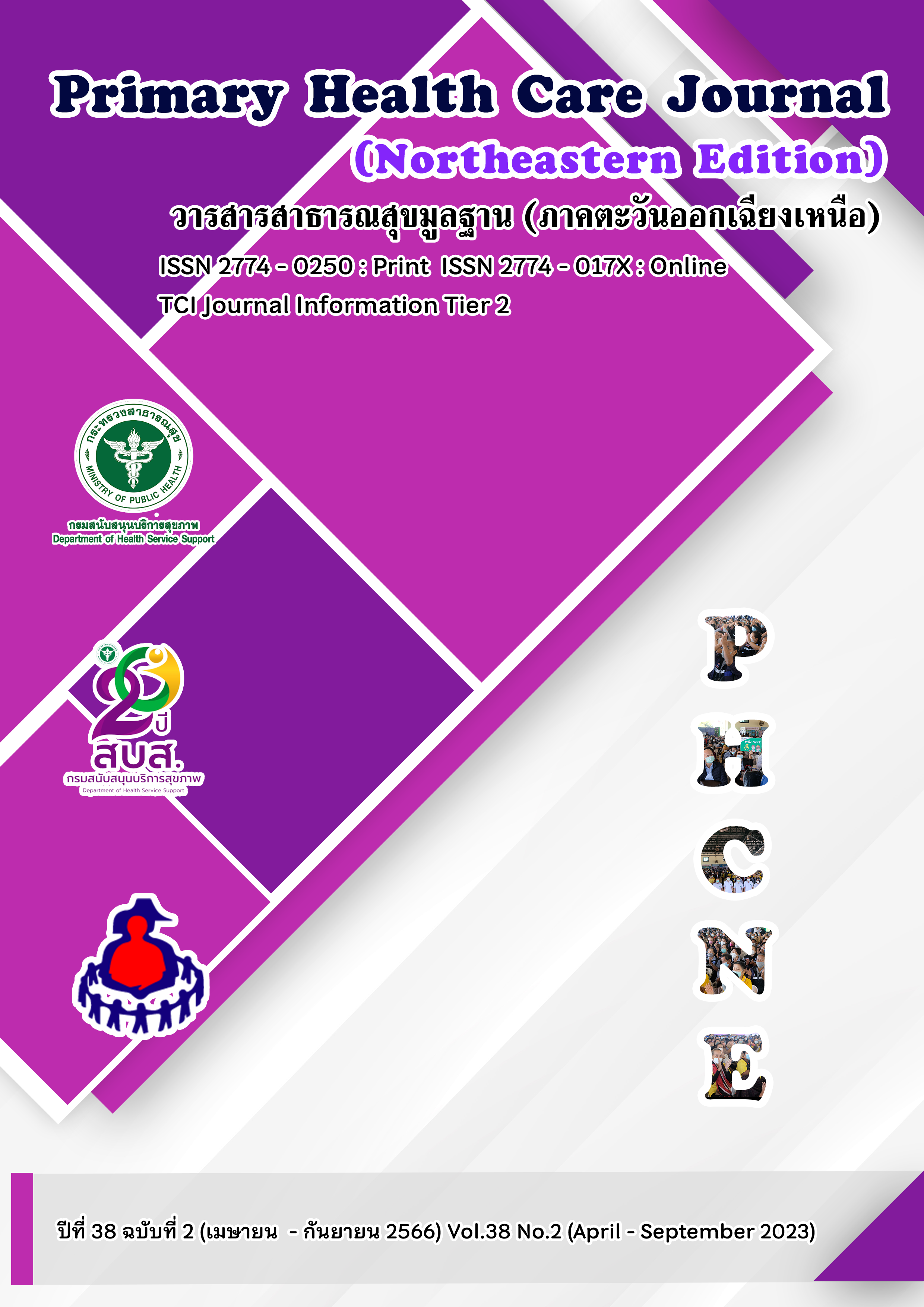RELATIONSHIP OF PERSONAL FACTORS KNOWLEDGE WITH RISKY BEHAVIOR ON CEREBROVASCULAR DISEASE AMONG THE ELDERLY WITH HYPERTENSION
Keywords:
Knowledge, Self-care behavior, Stroke, ElderlyAbstract
The purposes of this cross-sectional research were to examine the relationship between personal factors knowledge with risky behavior and cerebrovascular disease among the elderly with hypertension. The sample consisted of 476 elderly people with high blood pressure collected by simple random sampling at Ban Nong Waeng Health Promoting Hospital, Phon Khwao Sub-district, Mueang District, Sisaket Province. The research instruments are knowledge tests and questionnaires by the researcher, with reliability of 0.87 and 0.94. Statistics used for data analysis included frequency, percentage, mean, standard deviation, chi-square, and Pearson’s product moment correlation. The research results found that from a random sample of 476 elderly people with high blood pressure, they had a level of knowledge about cerebrovascular disease at a moderate level of (72.20%) (SD = 0.40) and a level of risk behavior for cerebrovascular disease at a moderate level of mean score 2.04 (SD = 0.67). Factors associated with risky behaviors for cerebrovascular disease in elderly people with high blood pressure include gender, marital status, education level, occupation, and average monthly income. Immediate relatives suffering from chronic illnesses and knowledge about cerebrovascular disease in terms of stress, It is associated with risky behaviors associated with cerebrovascular disease in elderly people with high blood pressure. Statistically significant at the.05 level.
References
จตุพงษ์ พันธ์วิไล และคณะ. (2565). ความสัมพันธ์ระหว่างความรู้ ความเชื่อด้านสุขภาพและพฤติกรรมการป้องกันการเกิดโรคหลอดเลือดสมองในผู้สูงอายุที่มีภาวะเสี่ยง โรงพยาบาลประสาทเชียงใหม่. วารสารศูนย์อนามัยที่ 9, 16(3), 882-895.
ชูชาติ กลิ่นนาคร และสุ่ยถิน แซ่ตัน. (2563). ปัจจัยที่มีความสัมพันธ์กับพฤติกรรมการป้องกันตนเองจากโรคหลอดเลือดสมองของผู้ป่วยโรคความดันโลหิตสูงที่สามารถควบคุมระดับความดันโลหิตได้ อําเภอด่านช้าง จังหวัดสุพรรณบุรี. วารสารสภาการสาธารณสุขชุมชน, 2(2), 62-77.
ดวงธิดา โสดาพรม และศวิไลช์ วนรัตน์วิจิตร. (2564). ปัจจัยที่มีอิทธิพลต่อพฤติกรรมการป้องกันโรคหลอดเลือดสมองในผู้สูงอายุกลุ่มเสี่ยง เขตเทศบาลเมืองอรัญญิก อำเภอเมืองพิษณุโลก จังหวัดพิษณุโลก. วารสารวิทยาลัยพยาบาลพระปกเกล้า จันทบุรี, 32(2), 98-111.
ธณกร ปัญญาใสโสภณ. (2564). ระเบียบวิธีวิจัยสำหรับการจัดการสร้างเสริมสุขภาพ. (พิมพ์ครั้งที่ 1). นครราชสีมา: ห้างหุ้นส่วนจำกัด เลิศศิลป์ สาส์ณ โฮลดิ้ง.
นิศาชล นุ่มมีชัย, นิภาวรรณ สามารถกิจ และเขมารดี มาสิงบุญ. (2560). ปัจจัยที่มีความสัมพันธ์กับการตอบสนองต่ออาการของโรคหลอดเลือดสมองในญาติผู้ป่วยโรคหลอดเลือดสมองขาดเลือดระยะเฉียบพลัน. วารสารการพยาบาลและการศึกษา, 10(3), 23-38.
สถาบันประสาทวิทยา กรมการแพทย์บริการ. (2561). แนวปฏิบัติการพยาบาลทางคลินิกโรคหลอดเลือดสมอง. (พิมพ์ครั้งที่ 1). กรุงเทพฯ: บริษัท ธนาเพรส จำกัด.
ปิยนุช จิตตนูนท์ และคณะ. (2564). ความรู้โรคหลอดเลือดสมองและพฤติกรรมป้องกันของกลุ่มเสี่ยงโรคหลอดเลือดสมอง: กรณีศึกษาตำบลห้วยนาง จังหวัดตรัง. วารสารพยาบาลสงขลานครินทร์, 41(2), 13-25.
โรงพยาบาลส่งเสริมสุขภาพตำบลบ้านหนองแวง. (2563). ศูนย์ข้อมูลโรงพยาบาลส่งเสริมสุขภาพตำบลบ้านหนองแวง. โรงพยาบาลส่งเสริมสุขภาพตำบลบ้านหนองแวง อำเภอเมือง จังหวัดศรีสะเกษ.
อณัญญา ลาลุน และไพฑูรย์ วุฒิโส. (2564). ปัจจัยทํานายพฤติกรรมป้องกันโรคหลอดเลือดสมองของผู้ป่วยโรคความดันโลหิตสูง โรงพยาบาลส่งเสริมสุขภาพตําบลนาฝาย จังหวัดชัยภูมิ. วารสารพยาบาล, 70(2), 27-36.
Bloom, B.S. (1956). Taxonomy of Educational Objectives, Handbook I: The Cognitive Domain. New York: David McKay Co Inc.
Pothiban L, Srirat C. (2019). Association between stroke knowledge, stroke awareness, and preventive behaviors among older people: A cross-sectional study. Nurse Health Sci, 21(3), 399-405.
Stretcher VJ, Rosenstock IM. (1997). The health belief model. In: Glanz K., Lewis F.M., &Rimer B.K., (Eds.). Health behavior and health education: Theory, research and practice. (2nd ed). San Francisco: Jossey-Bass.
World Stroke Organization. (2012). About world stroke day. Retrieved from http://www.worldstrokecampaign.org/media/Pages/AboutWorldStrokeDay2010.asp (20 September 2023)
World Stroke Organization. (2017). What’s your reason for preventing stroke. Vienna: World Stroke Organization 2017. Retrieved from https://www.worldstroke.org/assets/downloads/English-World Stroke Day 2017 Brochure 20170720.pdf (16 September 2017)
Yamane T. (1973). Statistics: An Introductory Analysis. (2nd Ed). New York: Harper and Row.
Downloads
Published
How to Cite
Issue
Section
License
Copyright (c) 2023 ศูนย์พัฒนาการสาธารณสุขมูลฐาน ภาคตะวันออกเฉียงเหนือ จังหวัดขอนแก่น กรมสนับสนุนบริการสุขภาพ กระทรวงสาธารณสุข

This work is licensed under a Creative Commons Attribution-NonCommercial-NoDerivatives 4.0 International License.




